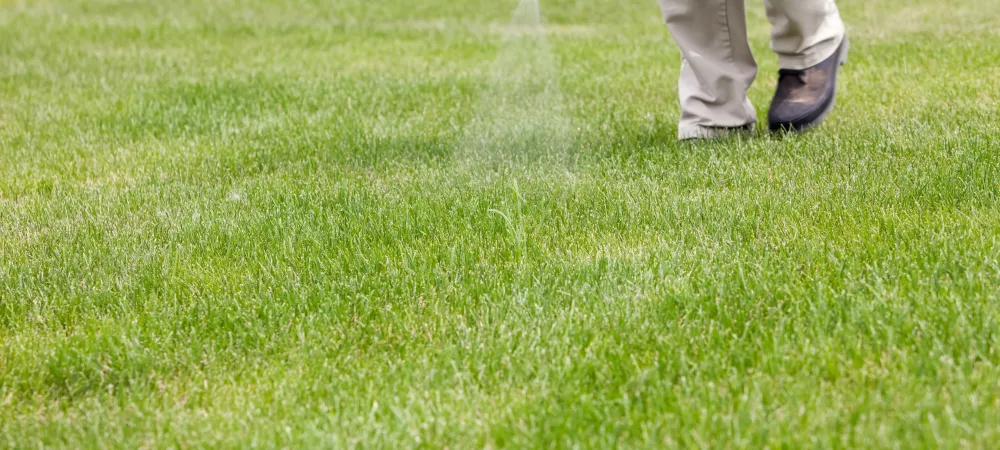Late Season Annual Bluegrass Control

Annual bluegrass seed germinates throughout the late-summer and early-fall once soil temperatures drop below 70° F. Seedlings grow and mature in fall, overwinter in a vegetative state, and produce seed in spring. The second germination can occur in late-winter as soil temperatures rise and the days become longer. Annual bluegrass is a prolific seed producer and individual plants may produce hundreds of viable seeds, even when closely mowed. Annual bluegrass flowers over several months in spring and produces a seed that may remain dormant in the soil for years before germinating. Annual bluegrass often dies from summer stresses but may survive in protected sites that receive irrigation. Controlling annual bluegrass in mid-to late-spring in residential lawns can be difficult.
How to Handle Bluegrass in the Spring
Up until mid-February, when the bermudagrass was fully dormant, applying a glyphosate-containing product (e.g. Roundup) was an option for postemergence annual bluegrass control. Even then, care must be taken not to “overdose” the weed and harm the bermudagrass. It is too common that homeowners over-spray the weed with glyphosate and some herbicide moves deep into the bermudagrass canopy where it contacts green bermudagrass stolons near the ground. Any green part of the plant in the bermudagrass can absorb the glyphosate which can damage the plant. It is now too late and risky to consider spraying glyphosate to control annual bluegrass in dormant bermudagrass. While bermudagrass may still look “completely” dormant it is starting to greenup and the application of glyphosate during greenup can damage the turf.
Unfortunately, there are few selective herbicidal options for homeowners to control annual bluegrass at this point in the season. In bermudagrass and zoysiagrass, if the annual bluegrass population is bad enough the best option is to consider hiring a professional lawn care operator and request the annual bluegrass be treated with either Revolver (foramsulfuron) or Monument (trifloxysulfuron). Both herbicides are applied at a low use rate and are expensive. For the homeowner, this makes them difficult to correctly mix and cost-prohibitive. Although they are not restricted use pesticides, these herbicides are available through professional lawn care outlets and are not found in retail “big box” stores or in ready-to-use (RTU) formulations.
Neither of these herbicides is labeled for use on centipede grass or St. Augustine grass. In centipede grass and St. Augustine grass, atrazine containing products (e.g. Scotts Bonus S) is an option but large annual bluegrass grass plants are difficult to control with a single application.
Planning for Next Season
The weed is an annual cool-season grassy weed that will die-out in a couple of months as temperatures warm. For now, having patience and tolerance may be the best option. Plan for next winter and spring. Begin with good turfgrass cultivation this summer. For example:
- Deep and infrequent irrigation encourages turf grass root development which improves the ability of the lawn grass to compete with weeds.
- Identify and alleviate soil compaction since annual bluegrass prefers compacted soils. For rapid recovery and improved vigor, core aerifications should be performed during the active growth period of warm-season turfgrasses.
- Mow the lawn at the appropriate height for the grass species. Lower mowing heights may stress turf and reduce its ability to compete with annual bluegrass.
- Lastly, implement a preemergence herbicide program in late-summer to help control the seed that was deposited this season.
Contact Your Local Lawn Care Company
Our lawn care experts are here to answer any questions you may have about bluegrass control. We are experts with both warm-season and cool-season grasses and know exactly how to handle any bluegrass outbreak in your yard. Give us a call at [phone-number] and we will be happy to chat with you.
